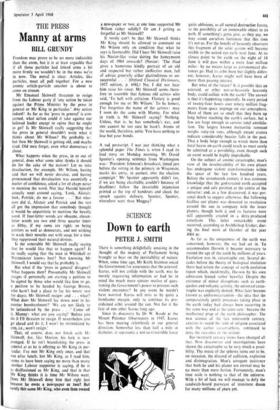Down to earth
SCIENCE PETER J. SMITH
There is something delightfully amusing in the thought of the majesty of Parliament being brought to bear on the inevitability of nature. When, some time ago, Mr Keith Stainton asked the Government for assurances that the asteroid. Icarus, will not collide with the earth, was he merely requesting information or had he in mind the much more sinister motive of ques- tioning the Government's power to prevent such violent encounter? In any event he needn't have worried. Icarus will miss us by quite a handsome margin, only to continue its pre- ordained orbit around the sun. Not for it the fate of one other Icarus long ago.
Since its discovery by Dr W. Baade at the Mount Palomar Observatory in 1947, Icarus has been moving relentlessly in our general direction. Somewhat less than half a mile in diameter, it represents a not-so-irresistible force
quite oblivious, as all natural destructive forces, to the possibility of an immovable object in its path. If something's gotta give, as they say, we may count ourselves fortunate that this time it's not us. For the benefit of heavenly observers this fragment of the solar system will become visible to the naked eye early next June. At its closest point to the earth on the night of 14 June it will pass within a mere four million miles—by no means large as astronomical dis- tances go. Had its orbit been but slightly differ- ent, however, Icarus might well have been of more than passing interest.
But what of the future? Is it possible that an asteroid, or other not-so-heavenly heavenly body, could collide with the earth? The answer is that it's happening repeatedly. In every period of twenty-four hours over ninety million frag- ments from space impinge on our atmosphere. Most of them are so small that they burn up long before reaching the earth's surface, but a few are large enough to survive total annihila- tion. The largest known meteoritic remnant weighs sixty-six tons, although extant craters indicate considerably heavier falls in the past. That a body large enough to wreak more than local havoc on earth could reach us must surely be admitted as a possibility, even though such an event would be highly improbable.
On the subject of cosmic catastrophe, man's view of the invulnerability of his own planet has undergone violent transformations within the space of the last few hundred years. Before the seventeenth century it was common knowledge that the god-created earth occupied a unique and safe position at the centre of the universe; and, as a few discovered, it was per- sonal death to suggest otherwise. But following Galileo our planet was demoted to revolution around the sun in company with the lesser planets, though both it and its features were still apparently created in a deity-produced cataclysm. This latter remarkable event occurred, according to Archbishop Ussher, dur- ing the final week of October of the year 4004 ac.
As far as the uniqueness of the earth was concerned, however, the rot had set in. To accommodate Darwin it became necessary to extend the age of the earth by millions of years. Evolution was in, catastrophe out. Several de- cades before the theory of biological evolution there had arisen the concept of earth evolution (upon which, incidentally, Darwin by his own admission leaned rather heavily). Despite the existence of minor disruptions such as earth- quakes and volcanic activity, the universal catas- trophe was explicitly denied. What later became known as uniformitarianism—the idea that the comparatively gentle processes taking place in the earth today had always been occurring in the same way and at the same rate--became the intellectual prop of the earth philosopher. The new science of the late nineteenth century. anxious to avoid the taint of religion associated with the earlier caustrophists. continued to deny the existence of the violent.
But twentieth century Views have changed all that. New discoveries and investigations have shown the catastrophe to be very much a possi- bility. The music of the spheres turns out to be, on occasion, the discord of collision, explosion and disintegration. Man's arrogant insistence that both he and his planet are eternal may be no more than mere fiction. Fortunately, man's time scale is nothing to that of the universe. With a bit of luck we will manage to defy the sandwich-board purveyor of imminent doom for many millions of years yet.














































 Previous page
Previous page